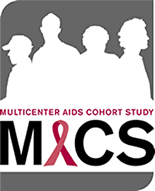More
Liver-related Death for HIV/HBV than HIV/HCV Coinfection in MACS Cohort
 |
 |
 |
 |
| SUMMARY:
HIV positive gay and bisexual men in
the log-running Multicenter AIDS Cohort Study (MACS) were
significantly more likely to die of liver-related causes than
HIV negative participants, and those coinfected with hepatitis
B virus (HBV) had about double the risk of death than those
with hepatitis C virus (HCV) coinfection, according to a poster
presented at the 18th Conference on Retroviruses and Opportunistic
Infection (CROI 2011) last week
in Boston. |
|
 |
 |
 |
 |
By
Liz Highleyman
Since the
advent of effective antiretroviral
therapy (ART), liver disease has become a leading cause of death
among people with HIV. Over years or decades, chronic HBV
and HCV infection can progress to
severe liver disease including cirrhosis,
liver cancer,
and ultimately end-stage liver failure; evidence indicates that this
process may happen faster in HIV positive
people.
 Oluwaseun
Falade-Nwulia from Johns Hopkins University and colleagues compared
rates of liver-related mortality between participants in the MACS cohort
who were infected with HBV or HCV.
Oluwaseun
Falade-Nwulia from Johns Hopkins University and colleagues compared
rates of liver-related mortality between participants in the MACS cohort
who were infected with HBV or HCV.
MACS is
an ongoing prospective study of the natural history and HIV treatment
outcomes of men who have sex with men (MSM) in Baltimore, Chicago, Pittsburgh
and Los Angeles. The study has enrolled approximately 7000 men, both
HIV positive participants and HIV negative control subjects.
Men in the present analysis had either chronic hepatitis B (HBsAg positive)
or chronic hepatitis C (HCV antibody and HCV RNA positive) at study
entry; men with both viruses were excluded.
A total of 680 men were included in the analysis. About 75% were white
and the median age was 35 years. Of these, 472 men (69%) were HIV positive,
337 had chronic hepatitis B, and 343 had chronic hepatitis C; thus,
229 were HIV/HBV coinfected and 243 were HIV/HCV coinfected.
Participants were followed for a median of 7 years (ranging from just
5 months to 25 years). The researchers obtained causes of death from
death certificates, and compared rates of liver-related mortality and
all-cause mortality in HBV-infected and HCV-infected men, adjusting
for potential confounding factors.
Results
 |
There were a total of 51 liver-related deaths during 6249 person-years
of follow-up: |
 |
36
among people with HBV (10.3 deaths per 1000 person-years); |
 |
15
among people with HCV (5.5 deaths per 1000 person-years). |
|
 |
Liver-related
mortality was about twice as high for the chronic hepatitis B group
than the chronic hepatitis C group, after adjusting for race/ethnicity,
age, HIV status, CD4 cell count, and alcohol use. |
 |
A
majority of participants (46) who died from liver-related causes
were HIV positive. |
 |
The
liver-related death rate was 14.5 per 1000 person-years in the HIV/HBV
coinfected group, compared with 8.0 per 1000 person-years in the
HIV/HCV coinfected group. |
 |
Among
people with HIV, liver-related death remained about twice as high
among HIV/HBV compared with HIV/HCV coinfected men after adjusting
for race/ethnicity, age, CD4 count, alcohol use, and use of antiretroviral
drugs active against HBV (IRR 2.16). |
 |
A
similar model, however, did not show any difference in all-cause
mortality between HIV/HBV and HIV/HCV coinfected participants (RR
1.06). |
 |
Among
people with hepatitis B or HIV/HBV coinfection, liver-related mortality
rose between 1984-1996 and 1997-2002, but then fell during 2003-2010. |
 |
All-cause
mortality decreased from the first to the second period, and fell
further from the second to third. |
 |
Use
of antiretrovirals active against HBV as well as HIV did not independently
predict less liver-related death, though mortality did start to
decline in 2003 when tenofovir (Viread) became widely available.
|
 |
Lower
CD4 cell count was associated with a significantly greater risk
of liver-related death. |
"In
this cohort of MSM, the majority of liver-related deaths were in HIV-infected
individuals," the MACS investigators concluded. "Chronic HBV
infection was associated with a higher risk of liver-related death than
was chronic HCV infection in all subjects and in the HIV-infected subgroup."
These results, they added, underscore the need for expansion of HBV
screening, vaccination to protect against HBV infection, and treatment
of HIV/HBV coinfected individuals with dually active drugs."
Investigator affiliation: Johns Hopkins Univ School of Medicine,
Baltimore, MD.
3/11/11
Reference
O
Falade-Nwulia, E Seaberg, C Rinaldo, and others. Liver-related Mortality
Risk Is Greater from Chronic HBV than from Chronic HCV: MACS, 18th Conference
on Retroviruses and Opportunistic Infections (CROI 2011). Boston. February
27-March 2, 2011. Abstract
968.